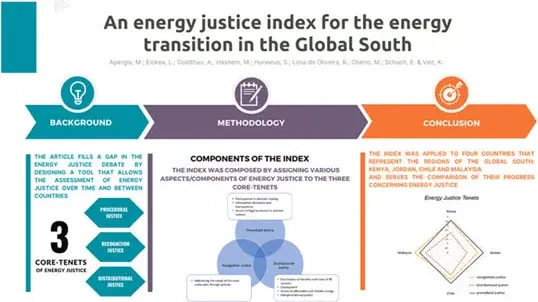The energy transition is necessary to avoid dangerous climate change and satisfy global energy needs. However, with the change of energy systems, questions regarding how to enact this transition properly, without enlarging or creating new global inequalities, arise. This issue is of particular interest for countries of the Global South, where the hopes for a just energy transition are especially high.
The article “An energy justice index for the energy transition in the Global South” presents the first quantitative approach to measure the extent to which energy transitions in the Global South incorporate elements of energy justice. For this purpose, the article proposes an energy justice index that measures the compliance of countries with three core-tenets of energy justice: distributional, recognition and procedural justice, considering diverse social and development objectives such as accessibility of energy, and the involvement of marginalised parts of the society. Furthermore, the authors applied the designed index to select countries from Southeast Asia (Malaysia), sub-Saharan Africa (Kenya), the MENA region (Jordan), and Latin America (Chile), concluding with valuable insights regarding the current energy justice stance in the energy transition of the examined Global South nations.
This truly international effort was done with the participation of Prof. Dr. Andreas Goldthau, Director of the Brandt School; and Laima Eicke, EIPCC early career researcher; as well as experts from Jordan (Mustafa Hashem); Chile (Sebastian Huneeus); Malaysia (Renato Lima de Oliveira); Kenya (Maureen Otieno); and researchers from the Research Institute for Sustainability (RIFS), Maria Apergi, Esther Schuch, and Konstantin Veit.
To learn more about the energy justice index and its application, you can find the article here.

